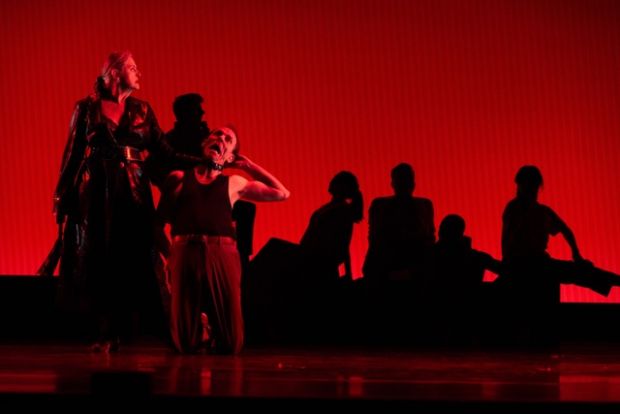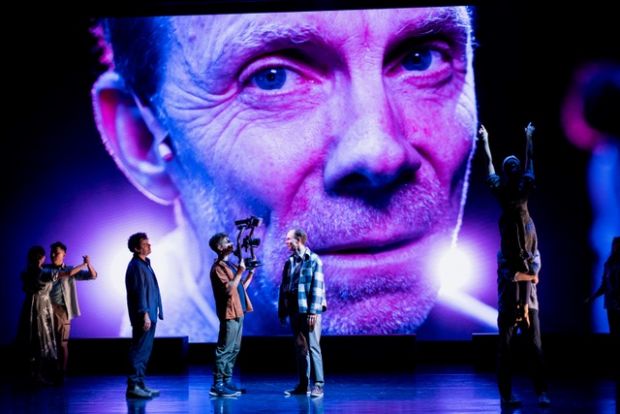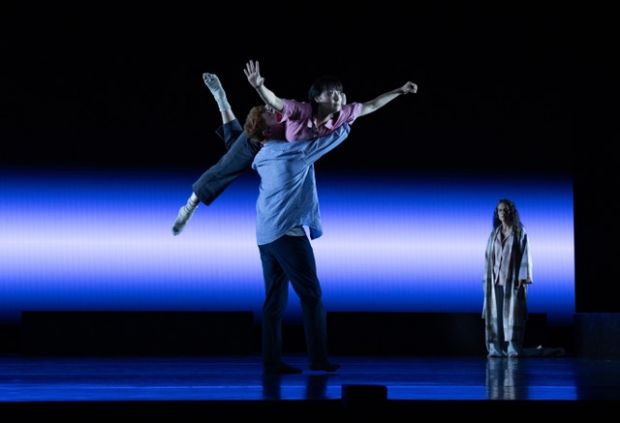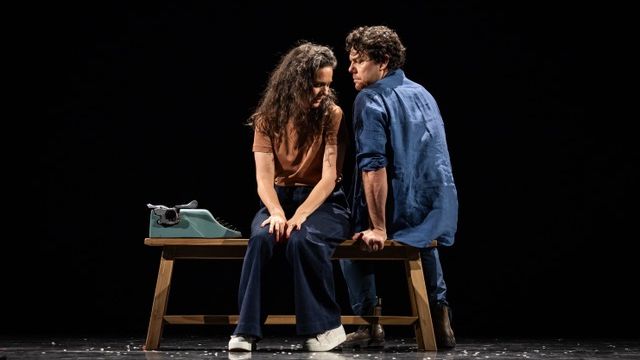Trent Dalton’s Love Stories
Trent Dalton’s Love Stories was originally commissioned and produced by the Brisbane Festival and QPAC for the Brisbane Festival of 2024. It is a unique adaption of a novel to a play in that it also features immersive camera work, back projection and dance. This conception adapted from the book by Tim McGarry, allows to audience to get up close and personal with the production.
Beginning its life as a compilation of stories collected by Dalton in King George Square Brisbane, Trent Dalton’s Love Stories adapts the real stories of people Dalton interviewed for his book, with Dalton finding his own meaning of love in his marriage as the ‘glue’ that holds the stories together.
The set is sparse, a bare stage with benches on either side and a giant projection screen at the back with the focus remaining on the actors who inhabit different passersby telling their stories to Dalton.
Before the play begins, thanks to a camera on a central pole flown in, the audience see themselves on the back projection screen along with some written comments from the audience presumably gathered the night before. A clever device as it reminds us that this production is about everyday people just like us.

Director Sam Strong uses the space of the Playhouse stage to its full potential and elicits strong performances from his cast. The stripped back set design by Renee Mulder (who also designed the costumes) rightly focusses the attention on the character’s stories and the hustle and bustle of city life where it is easy to become ‘lost’. The props are simple and are brought on by the cast when out of light.
The set design is enhanced by Ben Hughes’ lighting design, Craig Wilkinson’s video design and cinematography, Stephen Francis’ original music and sound design and Nerida Matthaei’s choreography. They all work as one cohesive unit ensuring the message of the play is clear.
The cast features Rashidi Edward as Jean-Benoit, Jason Klarwein as the husband, Michala Banas as the wife, an ensemble consisting of Patrick Jhanur, Angie Milliken, Kirk Page, Bryan Probets, Jacob Watton & Hsin-Ju Ely, plus Tnee Dyer’s camera operation.
They take on multiple roles which are featured using extreme close ups and switch quickly to create the busy city vibe. Dalton being interrupted by street photographers and aggressive strangers brings the world to life as does the changing from the city to other locations, mainly the husband and wife’s home, where the mood is anything but loving.
The central story though is Dalton’s quest to find the meaning of love, his own view of the topic seems remarkably positive, love is hopeful. This hope is reflected in every story told in the play, with love being presented as sometimes tricky to manage, but ultimately joyous. Jason Klarwein is the ultimate optimist when it comes to his own marriage. He knows it can get better, but for a long while is unsure how to accomplish this. Klarwein gives a compelling performance.

His wife played by Michala Banas is not so optimistic, and finds herself unable to understand her husband’s motives, even after many years of marriage. Her journey to find happiness is not easy, and Banas gives a remarkable performance.
The rest of the cast all have their moments to shine. Stand out moments include - Joshua Creamer, a local barrister and human rights activist who tells his story of land rights, family, and his identity as an Aboriginal man, a men’s wellbeing group where the exercises are a bit too close to be comfortable and the Dominatrix and her submissive.
There is a nice balance of humour and sadness in the stories, with even the humorous stories delivering a powerful message.
This balance and the staging of the production are its strength. Having actors stand and deliver their stories would soon become tiresome. Not so with Trent Dalton’s Love Stories. The production runs at one hour and forty minutes without an interval. The time flies by and the audience are captivated as evidenced by the cheering and standing ovations, thoroughly deserved.

To top off an emotional night in theatre, we are introduced to the real characters on which the play (and novel) is based. They appear on the back projection screen adding another layer of realism to the narrative. We can identify with these characters and will take them back to our everyday lives in our memory. This device was also used in the final moment of the film Schindler’s List with an equally heartbreaking effect.
I was impressed by the sincerity of the cast and production crew during the speech the bows. It was as moving as the play and a wonderful way to finish a memorable evening.
Trent Dalton’s Love Stories is a groundbreaking amalgamation of story, photography and dance. It is mesmerising from start to finish and a must see at the Adelaide Festival!
Barry Hill OAM
Images by Craig Wilkinson
Click here to check out our other Adelaide Festivall 2025 reviews
Subscribe to our E-Newsletter, buy our latest print edition or find a Performing Arts book at Book Nook.

